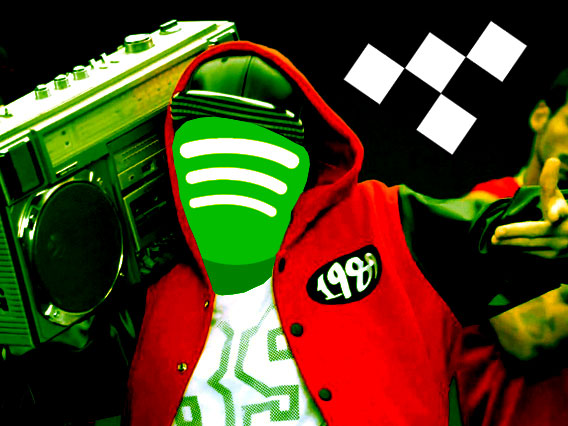Right now Spotify is the undisputed king of the music streaming industry. And while Pandora Music Radio still has a considerable presence in the US, their popularity is falling faster than their stock prices.

Smashing Records
Marquee rappers like Kendrick Lamar and Drake have brought unparalleled success to Spotify in recent months by dropping record- breaking albums. Kendricks “To Pimp A Butterfly” broke Spotify’s most plays in a day record with an incredible 9.6 million, while Drake’s recent mixtape “If You’re Reading This It’s Too Late” managed to gain 17.3 million streams in 3 days.
So with Spotify’s revenues climbing well over $1 billion in late 2013, the undisputed king of music streaming should be sitting comfortable atop their throne, right? Well, not exactly…
Watch the Throne
The kingdoms subjects started getting restless when pop princess Taylor Swift spoke out against Spotify last year and decided to remove her whole catalogue from the popular streaming site. Since Tswift’s public condemnation, others have started to sharpen their pitchforks and join the rebellion including industry heavyweights, Universal Music Group.
Taylor Swift and Universal are speaking out against Spotify’s popular “freemium” service, which allows users to listen for free, as long as they’re happy to put up with a few ads. Taylor feels that this cheapens her product, and kills album sales. Universal is singing the same tune with their chief executive Lucian Grainge recently explaining the need for change to Rolling Stone Magazine.
“We want to accelerate paid subscription. Ad-funded on-demand is not going to sustain the entire ecosystem of the creators as well as the investors.”
If you look at Spotify’s financial situation through a negative lens you can begin to see why Swift has cut ties with the streaming service. In 2013 roughly 90% of Spotify’s revenue came from paid subscribers – or a cool $US 897 million – leaving a measly $90 million in revenue coming from their freemium/advertising model. With this in mind it becomes easier to understand how spotify has yet to turn a profit, with a staggering 70% of revenue passed onto record labels and music publishers.
Challengers Stake Their Claim
There is no shortage of competitors ready to take Spotify’s mantle. Apple’s $3 billion acquisition of Beats Music has allowed them to get their hands on Beat’s promising music streaming platform, as well as gaining invaluable music contacts through super producer Dr Dre and Interscope Records co-founder Jimmy Iovine.
Google has also joined the party by releasing a streaming service via Youtube. Not to mention other competitors like Jay Z’s much anticipated, Tidal music streaming service.
I’m Not a Businessman. I’m a Business, man
The Blueprint MC recently sent out a bat signal to all his musician pals to discuss the idea behind his new streaming service. Jay Z managed to get Madonna, Beyonce, Daft Punk, J. Cole, Taylor Swift and other music icons in one room to shoot a promo for Tidal. Jay Z’s idea is that an artists co-owned streaming service will give them a bigger slice of the pie.
Jay Z announced this artist led coalition would cost $20 per month for the Lossless High Fidelity version and $10 per month for the standard quality version. Jay Z and his pals are hoping consumers love the artists so much they will be willing to pay double the going rate for that warm fuzzy feeling of picking your favourite artist’s preferred streaming service. When said consumers have spent the last 5-10 years destroying the music industry by pirating every album they could ever want, that’s a huge risk.
Exclusive Content: A Double Edged Sword
The one thing that could make Tidal a powerhouse in music streaming, is its access to exclusive content. Tidal’s close bonds with marquee artists such as Rhianna, Beyonce, Taylor Swift grant the service exclusive access some of the music industry’s most popular content.
Exclusive content is a major weapon in the Tidal arsenal, but unfortunately that weapon could be turned against Tidal and its subscribers. Take the television streaming industry for example, where each competing service has exclusive rights to particular shows. These exclusive rights makes it harder for consumers to choose just one service to subscribe to. This same problem could happen in the music industry where you need to buy more than one service to enjoy content from all your favourite artists.
With major music labels applying pressure and competitors with big pockets entering the market, it seems that Spotify has a target on its back. But if there’s one lesson history’s taught us its: when your king there’s always someone looking to steal your crown.

Comments (0)